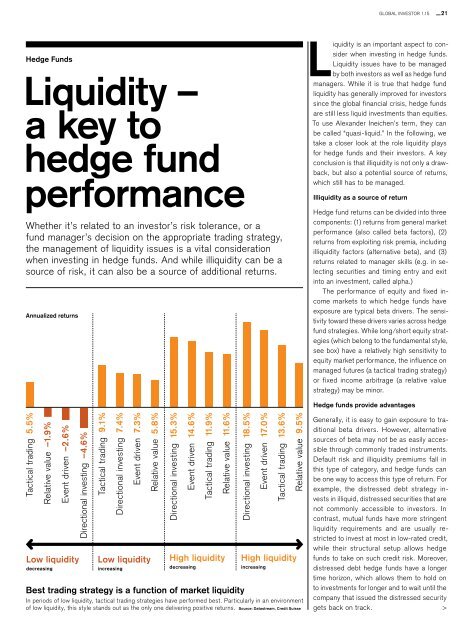Illiquid assets
Unwrapping alternative returns Global Investor, 01/2015 Credit Suisse
Unwrapping alternative returns
Global Investor, 01/2015
Credit Suisse
You also want an ePaper? Increase the reach of your titles
YUMPU automatically turns print PDFs into web optimized ePapers that Google loves.
GLOBAL INVESTOR 1.15 — 21<br />
Hedge Funds<br />
Liquidity –<br />
a key to<br />
hedge fund<br />
performance<br />
Whether it’s related to an investor’s risk tolerance, or a<br />
fund manager’s decision on the appropriate trading strategy,<br />
the management of liquidity issues is a vital consideration<br />
when investing in hedge funds. And while illiquidity can be a<br />
source of risk, it can also be a source of additional returns.<br />
Annualized returns<br />
Liquidity is an important aspect to consider<br />
when investing in hedge funds.<br />
Liquidity issues have to be managed<br />
by both investors as well as hedge fund<br />
managers. While it is true that hedge fund<br />
liquidity has generally improved for investors<br />
since the global financial crisis, hedge funds<br />
are still less liquid investments than equities.<br />
To use Alexander Ineichen’s term, they can<br />
be called “quasi-liquid.” In the following, we<br />
take a closer look at the role liquidity plays<br />
for hedge funds and their investors. A key<br />
conclusion is that illiquidity is not only a drawback,<br />
but also a potential source of returns,<br />
which still has to be managed.<br />
<strong>Illiquid</strong>ity as a source of return<br />
Hedge fund returns can be divided into three<br />
components: (1) returns from general market<br />
performance (also called beta factors), (2)<br />
returns from exploiting risk premia, including<br />
illiquidity factors (alternative beta), and (3)<br />
returns related to manager skills (e.g. in selecting<br />
securities and timing entry and exit<br />
into an investment, called alpha.)<br />
The performance of equity and fixed income<br />
markets to which hedge funds have<br />
exposure are typical beta drivers. The sensitivity<br />
toward these drivers varies across hedge<br />
fund strategies. While long/short equity strategies<br />
(which belong to the fundamental style,<br />
see box) have a relatively high sensitivity to<br />
equity market performance, the influence on<br />
managed futures (a tactical trading strategy)<br />
or fixed income arbitrage (a relative value<br />
strategy) may be minor.<br />
Hedge funds provide advantages<br />
Tactical trading 5.5%<br />
Relative value –1.9%<br />
Event driven –2.6%<br />
Low liquidity<br />
decreasing<br />
Directional investing –4.6%<br />
Tactical trading 9.1%<br />
Directional investing 7.4%<br />
Event driven 7.3%<br />
Low liquidity<br />
increasing<br />
Relative value 5.8%<br />
Best trading strategy is a function of market liquidity<br />
In periods of low liquidity, tactical trading strategies have performed best. Particularly in an environment<br />
of low liquidity, this style stands out as the only one delivering positive returns. Source: Datastream, Credit Suisse<br />
Directional investing 15.3%<br />
Event driven 14.6%<br />
Tactical trading 11.9%<br />
Relative value 11.6%<br />
High liquidity<br />
decreasing<br />
Directional investing 18.5%<br />
Event driven 17.0%<br />
Tactical trading 13.6%<br />
High liquidity<br />
increasing<br />
Relative value 9.5%<br />
Generally, it is easy to gain exposure to traditional<br />
beta drivers. However, alternative<br />
sources of beta may not be as easily accessible<br />
through commonly traded instruments.<br />
Default risk and illiquidity premiums fall in<br />
this type of category, and hedge funds can<br />
be one way to access this type of return. For<br />
example, the distressed debt strategy in -<br />
vests in illiquid, distressed securities that are<br />
not commonly accessible to investors. In<br />
contrast, mutual funds have more stringent<br />
liquidity requirements and are usually restricted<br />
to invest at most in low-rated credit,<br />
while their structural setup allows hedge<br />
funds to take on such credit risk. Moreover,<br />
distressed debt hedge funds have a longer<br />
time horizon, which allows them to hold on<br />
to investments for longer and to wait until the<br />
company that issued the distressed security<br />
gets back on track.<br />
>

















